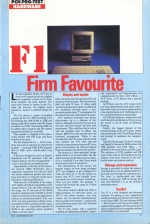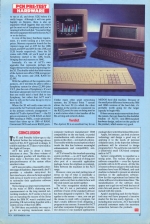
Personal Computer News
 1st September 1984
1st September 1984
Categories: Review: Machine
Author: Ian Scales
Published in Personal Computer News #076

Apricot XI - Hard Working XI
With the recent addition of a hard disk machine and networking to the Apricot family of machines, ACT now had the makings of a major office system on its hands.
The first of these to arrive was the Apricot XI, which gives the standard Apricot a 5Mb or 10Mb 3.5" Rodime hard disk in palce of one of its 3.5" disks. Although different in colour, the XI is almost the same as the standard Apricot in every other respect.
Even the price is not much affected by the hard disk storage capacity. Unlike most hard disk versions of MSDOS machines, for which you pay close to £4,000, the 5Mb version of the XI sells for £2,695 (excluding VAT), while its 10Mb sibling goes for only an additional £300. Certainly, the Apricot is not IBM PC compatible, so perhaps comparisons with machines like the IBM PC XT (a mere £4,150) are inappropriate. In terms of raw power per pound, you're obviously getting more for your money with ACT's XI.
Software
The XI is, of course, an MSDOS machine, and that has to count for something. Lots of popular pieces of MSDOS software have now been converted to run on ACT's 16-bit model, including a much improved version of Wordstar (the program which originally led PCN to dub the first Apricot as a slow machine). The XI comes bundled with the Supercalc and Superplanner programs. And at the launch of ACT's new F1 and Portable machines, the XI was even seen to be running the new Microsoft Windows version of MSDOS.
But ACT isn't putting all its money on MSDOS. Purchasers of the XI are entitled to get free copies of Digital's CP/M-86, Concurrent CP/M and Concurrent DOS. Like Concurrent CP/M, Concurrent DOS will let you run up to four applications at once, window those applications, treat the applications as 'virtual consoles' and do printer-spooling, but it will do that for both MSDOS and CP/M programs at once.
Just in case, however, you don't want to get Windows or Concurrent DOS, but do want windowing and integration, ACT has also tied up a deal with Lotus to produce versions of the Symphony integrated software suite for the Apricot.
Symphony requires at least 320K RAM to run at all, and about 512K before it's really happy. Although it will run quite happily on floppies, there is also an argument which suggests that you won't get the most out of Symphony until you're running it with a hard disk. You can bet that the latter argument will not be lost on ACT or on its dealers.
In view of this heavy hardware requirement, it's worth looking at a few more prices. Memory expansion boards for the Apricot range start at £195 for the 128K board, and £495 and £895 for the 256K and 512K boards respectively. Since the XI comes with 256K, all you'll need to get Symphony started is the 128K board, bringing the total memory to 384K.
Ironically, it's one of ACT's own upgrades that represents perhaps the biggest threat to this marketing strategy for the XI. The double-sided dual disk version of the Apricot now offers 720K storage per disk, a 9" screen and 256K RAM for £2,095.
With the addition of the requisite extra memory, ACT will then be able to offer a Symphony system for about £2,300 (plus VAT, plus the cost of Symphony). It's not that most salespeople won't try to tell you that you really need a hard disk to run Symphony, but rather that ACT won't have to rely on the Lotus tie-up to try to move the XI.
Where the XI will really come into its own is in the ACT network system. For use in the primary network arrangement - which ACT calls Apricot Point 7 - the XI gets an expansion to 512K RAM, an Intel 8086 running at 5MHz, a main processor board that takes up to 1Mb of RAM. Concurrent DOS and seven RS232 ports. Unlike many other small networking systems, the XI-based Point 7 system allows the host XI (to which the other machines in the system are connected via the RS232 ports) to carry on being used as a workstation while it also handles all the file-serving and network duties.
Verdict
The Apricot XI is an excellent buy for an MSDOS hard disk machine. Because of the small price difference between the 5Mb and 10Mb versions of the hard disk, it's probably worth going for the larger capacity to begin with.
If there are any major reservations about the system, they are based on the doubtful wisdom of ACT's non-standard hardware design, and not on the quality of the product, which seems very good.
This article was converted to a web page from the following pages of Personal Computer News #076.





